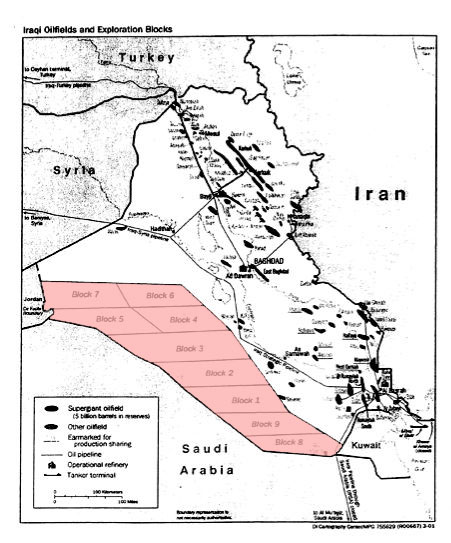
Despite hundreds of thousands of dead, and their country salted with depleted uranium, the Iraqis may yet take control of their democracy and natural resources--
IN SPITE of Bush, not because of him.
From before the start of the war, the Bush administration planned to privatize and sell off everything in Iraq to their cronies at bargain basement prices,
especially the oil.The Bushies one mistake is they thought the Iraqis are as stupid as the average Fox News viewer, and would believe whatever hatful of shit propaganda he dished out, and if they didn't, they could scare the Iraqis into obedience by picking up people at random and torturing and raping them at Abu Ghraib.
The Iraqis knew why Bush was there though, and even after
Bush vetoed their choice for prime minister and approved his replacement and
then threatened him with firing, the Iraqis refused to sign away their oil wealth to Bush's corporate cronies.
If the Iraqis are successful in hanging onto their oil, it might just shave a few years off the hatred Bush has earned for us. But it won't bring back
the grandmothers and babies crushed in rubble or
the arms burned off a boy in the initial and on-going shock and awe air strikes.
KEY EXCERPTS:
Tomgram: Jack Miles, Baghdad to Bush: You Have 14 Months
By December 31, 2008, according to Foreign Minister Hoshyar Zebari, the government of Iraq intends to have replaced the existing mandate for a multinational security force with a conventional bilateral security agreement with the United States, an agreement of the sort that Washington has with Kuwait, Saudi Arabia, and several other countries in the Middle East. The Security Council has always paired the annual renewal of its mandate for the multinational force with the renewal of a second mandate for the management of Iraqi oil revenues. This happens through the "Development Fund for Iraq," a kind of escrow account set up by the occupying powers after the overthrow of the Saddam Hussein regime and recognized in 2003 by U.N. Security Council Resolution 1483. The oil game will be up if and when Iraq announces that this mandate, too, will be terminated at a date certain in favor of resource-development agreements that -- like the envisioned security agreement -- match those of other states in the region.
The game will be up because, as Antonia Juhasz pointed out last March in a New York Times op-ed, "Whose Oil Is It, Anyway?":
"Iraq's neighbors Iran, Kuwait and Saudi Arabia…. have outlawed foreign control over oil development. They all hire international oil companies as contractors to provide specific services as needed, for a limited duration, and without giving the foreign company any direct interest in the oil produced."
By contrast, the oil legislation now pending in the Iraqi parliament awards foreign oil companies coveted, long-term, 20-35 year contracts of just the sort that neighboring oil-producers have rejected for decades. It also places the Iraqi oil industry under the control of an appointed body that would include representatives of international oil companies as full voting members.
The news that the duly elected government of Iraq is exercising its limited sovereignty to set a date for termination of the American occupation radically undercuts all discussion in Congress or by American presidential candidates of how soon the U.S. occupation of Iraq may "safely" end. Yet if, by the same route, Iraq were to resume full and independent control over the world's third-largest proven oil reserves -- 200 to 300 million barrels of light crude worth as much as $30 trillion at today's prices -- a politically incorrect question might break rudely out of the Internet universe and into the mainstream media world, into, that is, the open: Has the Iraq war been an oil war from the outset?
***
Clearly, some in Washington still think so. Shortly before the collapse of the Iraqi oil legislation effort, Bush's Commerce Department began quietly advertising for an Arabic-speaking legal advisor to help it in "providing technical assistance to Iraq to create a legal and tax environment conducive to domestic and foreign investment in Iraq's key economic sectors, starting with the mineral resources sector." (Read: starting with oil.) As it happens, the job description overlaps heavily with that of the Development Fund for Iraq's existing International Advisory and Monitoring Board, whose responsibility, according to U.N. Security Council Resolution 1483, has been to see to it "that all export sales of petroleum, petroleum products, and natural gas from Iraq…. shall be made consistent with prevailing international marketing best practices." Is the Commerce Department already planning for the demise of this board? Like the super-embassy and the super-bases, this bit of Commerce Department staffing-up bespeaks the urge to continue an invasive American presence in Iraq, including Iraq's energy sector, long after December 31, 2008. But if the occupation is shut down legally after that date and if Iraqi control over Iraqi oil reverts -- legally, at least -- to something close to pre-war status, that Commerce Department expert may find him or herself playing a less-than-major role in Baghdad. Instead, expect a new role for Iraq's hitherto excluded pool of domestic expertise. The Iraq National Oil Company began operations back in 1961; its legacy includes a skilled work force of trained oil workers. Notable, in fact, among those opposed to the failed oil legislation is the Iraqi Federation of Oil Unions. Its members object to provisions in the legislation that permit the hiring of foreign oil workers rather than Iraqis and -- in classic Bush Administration fashion -- exclude the union from any participation in contract negotiations. The Federation's protests have attracted a letter of support signed by six Nobel Peace Prize laureates.
FULL TEXT
MORE IRAQ OIL THEFT RESOURCES











